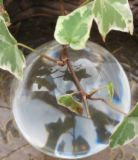I am a down to earth person who depends on the Earth to heal me and my family. I am Wiccan in faith and I am best known as a Kitchen Witch. I have degrees in Herbs and other things. I decided that I would share with al who are interested in the use of herbs in a medicinal way. Here I have for you a medicine cabinet contents that I use in my home. I grow my own herbs at home all year round inside and out of the home. Here is a listing of the herbs i use and the use for them.....
Slippery Elm powder - There are many uses for Slippery Elm powder that make it more than suitable for the use in the home. For internal applications, it can be made into a smooth paste with cold water which is then swallowed. This greatly helps alleviate the symptoms of gastritis, colitis and enteritis, as it is well tolerated by the stomach. It is helpful in providing a soothing relief for nagging coughs and in the treatment of acid reflux. No herbal medicine chest is complete without this useful herb on hand.
Peppermint - Aside from the traditional uses as a digestive for upset stomach, relief for cramping and gas, and fever reducer, peppermint can be used in pillows to promote restful sleep.
Lemon Balm - Lemon balm's primary use is in treating viral infections of the skin, especially for herpes and cold sores. Although it does not prevent flare-ups, it relieves the itching and helps the lesions heal faster, usually in a few days. Lemon Balm's success with skin infections has been well documented in clinical trials.
Chamomile - Useful in treating minor abrasions, cuts, and scrapes, and as a sedative and sleep aid. Chamomile is also useful in stopping spasms in the smooth muscles lining the stomach and intestines.
Activated Charcoal - Charcoal is used by hospital emergency rooms in cases of poison ingestion. I have found having activated charcoal on hand to be a lifesaver in cases of food poisoning or nausea. It has saved me a trip to the emergency room a couple of times! I definitely include charcoal in my herbal medicine chest.
TINCTURES:
In addition, there are three tinctures to have immediately on hand that are the most widely useful:
Echinacea tincture - Echinacea is herbal medicines primary choice in choosing natural cures for colds. Through stimulating the immune system, the herbs can also be used to treat chronic yeast infections in women and to prevent urinary tract infections. The roots and the whole plant are considered beneficial in the treatment of sores, wounds, and burns, possessing anti-inflammatory and antibacterial characteristics. It is one of the best of the antiviral herbs.
Valerian Tincture - Perhaps the most useful herb for sleep problems. Its calming and relaxing properties make it one of the best herbs for relieving stress and tension. In treating insomnia, valerian reduces the time it takes to fall asleep, allowing for a deep, restful sleep without creating grogginess the next morning.
Licorice Tincture - The most common use of licorice world-wide is to treat coughs and colds. Licorice is especially useful for treating coughs with sticky phlegm, or for treating colds that accompany an upset stomach.
ESSENTIAL OILS:
The following essential oils would be very useful to keep in a herbal medicine kit:
Tea Tree- therapeutic properties of tea tree oil are antimicrobial, antiseptic, antiviral, fungicide, and insecticide. Has shown promise in the treatment of head lice. It can also be helpful in treating cold sores and gingivitis. This is another "must have" for any complete herbal medicine chest.
Lavender- Lavender oil has a soothing and calming effect on the nerves, relieving tension, depression, panic, hysteria and other forms of nervous exhaustion. It's been known to be effective for headaches, particularly migraines. Lavender oil is one of the few essentials oils that can be used on the skin without dilution , and is especially useful when treating a minor burn wound.
Eucalyptus- One of the best antiviral herbs, Eucalyptus oil is very helpful when used for headaches, fevers, ailments of the respiratory tract and muscular aches and pains. It has a soothing and calming effect on the whole body and helps bolster the immune system.
Clove- Clove oil is useful for its disinfecting properties and in relieving pain, especially toothache, arthritis and rheumatism. It can also be effective for complaints of the digestion system. Clove oil is a common component in herbal insect repellents.
INFUSED OILS:
A couple of infused oils to have on hand would be an Arnica oil , St. John's Wort oil, and a Garlic Mullein Ear Oil -
Arnica Oil - A specific external treatment for physical trauma, sprains, bruising and other injuries. Use immediately after strenuous exertion or injury to prevent, relieve and reduce swelling, bruises and pain.
St. John's wort Oil - A valuable anti-inflammatory which can help speed the healing of wounds, bruises, varicose veins, sunburns, bee stings, and mild burns.
Garlic Mullien Ear Oil - a few drops in the ear canal can help heal ear infections.
OINTMENTS:
Ointments are wonderful for healing problems of the skin or with bruising, sore muscles and strains -
Chickweed - Especially useful for rashes, itching, and excema.
Calendula - For treating skin problems, bleeding, and minor burns.
Comfrey - Speeds wound healing and helps prevent scar tissue.
Marigold - For inflammations of the skin, bruising, or strains.
SUPPLIES:
Supplies you should have to prepare and store your natural medicine and herbs -
Beeswax
dropper bottles
tins and jars
Cheesecloth
Subscribe to:
Post Comments (Atom)

1 comment:
This is wonderful, keep up the good work
Post a Comment